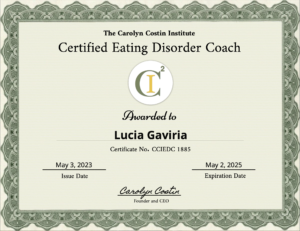about
Knowledgeable. Motivating. Compassionate.
A little about me:
I’m passionate about helping others recover from their eating disorder because I know what can be lost while having an eating disorder and what can be gained when you finally recover. I lost precious time and opportunities to pay attention to what’s important in life: people, relationships, meaningful events and little joyful details. Since I’ve recovered I’ve gained pleasure, joy, love, fun, compassion with myself and others, and many good friends. Helping people recover from eating disorders is a privilege of a job. I’m honored to be able to support my clients and witness their effort and commitment to liberate themselves from their eating disorder once and for all.

Qualifications
CERTIFIED: Eating Disorder Coach
The Carolyn Costin Institute Certificate
CCI trains coaches on how to best support a client and the client’s treatment team to
assist clients in making the necessary day-to-day behavior changes necessary for recovery.
For years in her private practice and her various treatment programs, Carolyn
Costin trained both licensed and non-licensed individuals with skills not taught in
traditional counseling and therapy programs, such as how to eat with clients, take
them grocery shopping or buy new clothes. These tasks are now
performed by eating disorder coaches, as an adjunct to traditional treatment.
The field of eating disorder coaching is rapidly growing, yet, until now, no formal,
rigorous training programs existed, thus she realized the need, and the Carolyn
Costin Institute was born. CCI is the first to offer a sophisticated, thorough,
rigorous certification program.
The coaching program has attracted students from all over the world, with
incredibly diverse backgrounds and life experiences: From therapists who desire
more eating disorder training, for chefs, housewives, and recovered individuals
who want the skills to help those with eating disorders recover.
A Carolyn Costin Institute Eating Disorder Coach assists clients in reaching their
treatment goals in real-life situations, providing support, appropriate challenges,
and serving as both a role model and guide.
Coaching is an important aspect of an overall strategy for treating individuals with
eating disorders. In essence, coaches provide a crucial aspect of treatment by
accompanying clients in everyday situations and providing exposure and
response prevention.

Other qualifications:
- Master in Business Administration (MBA) from Fordham University.
- Business Administration from University of Lima.
